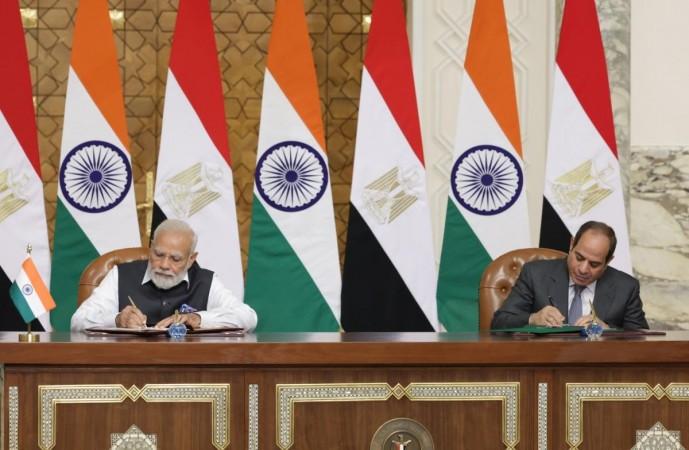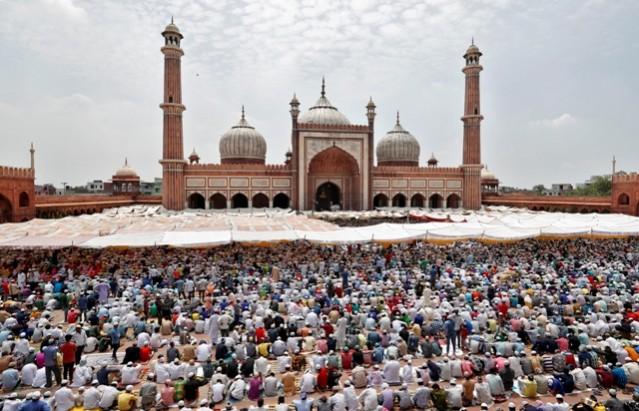India and Egypt have historically maintained friendly relations, which have grown stronger over the years. The diplomatic ties between the two countries were established shortly after India gained independence in 1947. Since then, bilateral relations have been characterized by mutual respect, cooperation, and cultural exchange. India and Egypt share deep ties that date back to the 1950s when they played key roles in founding the Non-Aligned Movement. India and Egypt have been working to strengthen their ties since then in various areas, including trade, investment, defence, and food security.
On June 25, 2023, Indian Prime Minister Narendra Modi visited Egypt, and the two countries signed a deal to elevate their relations to a "strategic partnership". During the visit, President Abdel Fattah el-Sisi of Egypt bestowed Modi with Egypt's highest honour. Bilateral trade between India and Egypt has been expanding, reaching a record $7.26 billion in the 2021-2022 fiscal year. India is also considering allowing Egypt to make purchases in rupees and to barter goods such as fertilizer and gas.

India is keen to boost ties with Egypt partly to secure trade through the Suez Canal, and Egypt's geostrategic location acts as a connecting link between India and Africa. The recent engagements between the two countries have been seen as an opportunity to develop a special relationship with a country that will always be an important player in the Middle East.
There is a significant Muslim population in both India and Egypt, with Islam being the dominant religion in Egypt, with approximately 90.3% of Egyptians identifying as Muslims, while in India, Muslims make up around 14.2% of the population. There is also a small Shia Muslim minority in Egypt. In India, there is a sect within the Ismaili Shiite branch of Islam called the Dawoodi Bohra community, which has its roots in Egypt. During his recent visit to Egypt, Prime Minister Narendra Modi interacted with the Bohra Muslim community.

As of 1990, Egyptian Islam was a complex and diverse religion. Although Muslims agreed on the faith's basic tenets, the country's various social groups and classes applied Islam differently in their daily lives. The literate theologians of Al Azhar University generally rejected the version of Islam practiced by illiterate religious preachers and peasants in the countryside. Al-Azhar University is traditionally Egypt's most respected and influential centre for Islamic study, and it has played an important role in shaping the religious discourse in Egypt.
Most upper- and middle-class Muslims believed either that religious expression was a private matter for each individual or that Islam should play a more dominant role in public life. Islamic religious revival movements, whose appeal cut across class lines, were present in most cities and in many villages. Today, devout Muslims believe that Islam defines one's relationship to God, to other Muslims, and to non-Muslims. They also believe that there can be no dichotomy between the sacred and the secular. Many devout Muslims say that Egypt's governments have been secularist and even antireligious since the early 1920s. Politically organized Muslims who seek to purge the country of its secular policies are referred to as "Islamists."
In India too, the various sects, madhabs and firqas form Indian Islam with the Deobandi, Barelvi schools of thought and the AIMPLB (All India Muslim personal Law Board), an NGO, dictating how the 20 crore Muslims should be governed in terms of family law, inheritance, and adoption. Indian Islam also has a largely dominant population upholding various Sufi saints and their shrines as devotional centres. However, there has been a strain of "Islamist" movements in India too since the 1980s, which have largely been tackled by counterinsurgency and counter-terrorism methods plus digital surveillance methods with the Indian judiciary making sure that innocent Muslims are not targeted due to fringe groups practicing extremism and upholding the stereotype of "Muslim terrorists".

The Indian and Egyptian governments have responded to the extremism and radicalisation challenges faced by their respective Muslim communities in different ways. The Egyptian government has been criticized for its crackdown on the Muslim Brotherhood (a far-right extremist organisation) which has led to political instability and uncertainty in the country. The government officially recognizes Sunni Islam, Christianity, and Judaism, and allows only their adherents to publicly practice their religion. The government has also sought the support of other Islamist actors, such as Salafis, while cracking down on the Muslim Brotherhood.
The Indian Government has stepped up crackdown on the PFI (Popular Front of India - an extremist organisation) members and banned it. The National Investigative Agency regularly raids the Jamat-e-Islami cadres and attaches their property while investigating their links and funding to terror groups sponsored by the ISI of Pakistan. The India-Egypt relationship is characterized by a shared desire to deepen cooperation in various areas, including politics, trade, defence, culture, education, and tourism. Both countries have continued to work towards enhancing their bilateral ties and exploring new avenues of collaboration.
[Disclaimer: This is an authored article by Arshia Malik. Views expressed are author's own.]

















